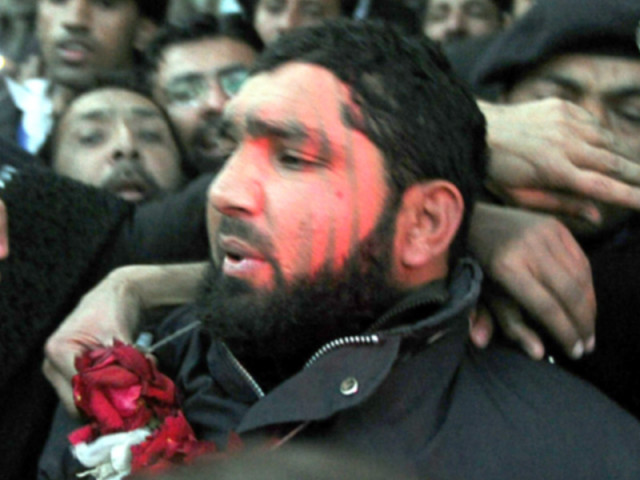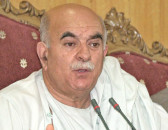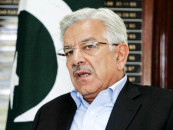Salmaan Taseer’s assassination: IHC upholds Qadri’s death sentence
Drops terror charge, saying it’s not proved that he created a sense of fear in society

A file photo of Mumtaz Qadri. PHOTO: AFP
Malik Mumtaz Qadri will be hanged only once for assassinating former Punjab governor Salmaan Taseer as the Islamabad High Court (IHC) has set aside one of the two death sentences awarded to him by an anti-terrorism court (ATC) in October 2011.
Qadri, a former police commando, had killed Taseer in Islamabad’s Kohsar Market in 2011 and later confessed to his crime, claiming that he had killed the ex-governor over his vocal opposition to the country’s blasphemy laws.
An ATC in Rawalpindi had sentenced Qadri to death on two counts under Section 302 of the Pakistan Penal Code (PPC) and 7 Anti-Terrorism Act (ATA) — a decision against which Qadri had filed an appeal in the IHC.
Giving verdict on the appeal on Monday, the two-judge IHC bench — comprising Justice Noorul Haq Qureshi and Justice Shaukat Aziz Siddiqui — set aside Qadri’s sentence under the ATA. However, the bench upheld his conviction under Section 302 of the PPC.

“Conviction and sentence recorded U/S 302 (b) PPC is upheld and appeal to this extent is dismissed. The murder reference is answered in affirmative.
“It is established beyond any reasonable doubt that the murder of the deceased at the hands of appellant was pre-planned, cold blooded and gruesome,” the bench noted.
While striking down the terrorism conviction, the bench said it had not been proved that Qadri had created a ‘sense of fear and sense of insecurity’ in society when he shot Taseer 28 times outside a cafe.
The ATA charges were dropped on grounds that only one prosecution witness stated that the incident created panic and no other witnesses declared that (the) occurrence resulted in intimidating and terrorising (the) public, the order said.
Secondly, Qadri murdered Taseer and he did not injure or assault any other person standing nearby the place of occurrence, it added.
In these circumstances, the bench stated, findings of the trial court declaring Qadri guilty of commission of the offence of terrorism were not sustainable and resultantly conviction of sentence awarded to the extent was liable to be set aside.
“However, we are convinced that learned trial court had the jurisdiction to hold trial,” the bench observed. On February 11, the bench had reserved its judgment after Islamabad’s Advocate General Mian Abdul Rauf, the prosecutor in the case, and Qadri’s counsels – including former Lahore High Court chief justice Khawaja Mohammad Sharif and justice (retired) Mian Nazeer – concluded their arguments.
The attorneys for Qadri drew on Islamic texts to argue that he was justified in killing Taseer and claimed that by criticising the blasphemy law the politician was himself guilty of blasphemy.
The order, however, made it clear that Qadri may be a pious man in his personal life but he was neither a scholar nor a Qazi and it was the job of the courts to declare if words attributed to a person amounted to blasphemy.
“Instances where the Holy Prophet (pbuh) forgave the contemnors are more in number than the instances where the contemnors were done to death,” the bench said.
“It is quite strange that appellant levelled allegations of ‘Kaba’ir’ (major sins) without any proof and merely on perceptions. This act of appellant cannot be termed as Islamic and moral,” they added.
The bench held that criminal act of the appellant was not justified under the principles of Islamic law governing the subject of blasphemy and said neither the Islamic law nor the law of the land gives any justification to the act of the accused.
Qadri’s lawyer welcomed the ruling setting aside terrorism charges.
Published in The Express Tribune, March 10th, 2015.



















COMMENTS
Comments are moderated and generally will be posted if they are on-topic and not abusive.
For more information, please see our Comments FAQ